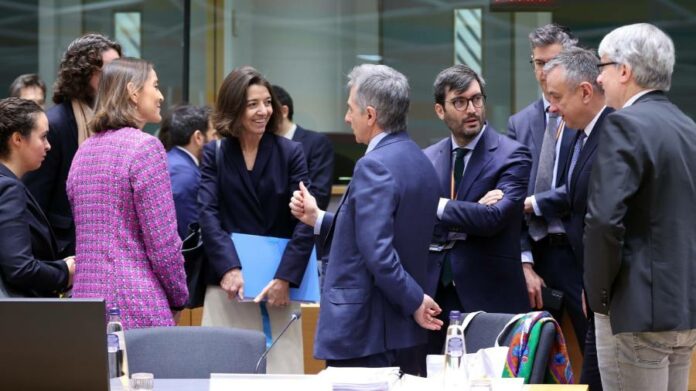To say that the EU is showing new enthusiasm for industrial policy — government support for strategic industries — might surprise those, particularly Americans, who regard Europe’s economies as already hopelessly snarled in regulation and distorted by dirigisme.
Yet when EU heads of government meet today and tomorrow in Brussels to plan their version of Joe Biden’s green tech splurge, they will be exploring some new territory. A growing number of leaders worry the traditional EU role of promoting internal competition is insufficient to create globally commanding positions in the investment-heavy technologies of the future.
It’s true that European economies are often highly regulated, some mainly at EU level (product standards) and some by member states (laws on minimum wages and trade unions). It’s also true that some, particularly France, have long tried to promote individual companies, labelling them “national champions”. But decades of the accretion of state aid and competition (antitrust) law has prevented the EU creating anything like the state-driven strategic investment model followed by many east Asian countries — and increasingly the US under the Biden administration.
Until now, economists have generally considered these restraints to be a virtue. Thomas Philippon, a French economist, has written persuasively and counter-intuitively about dynamic open European markets increasingly contrasting with the stultifying US regulations created by anti-competitive lobbying. He argues that powerful and assertive EU agencies like the competition directorate, currently headed by former Danish economy minister Margrethe Vestager, are stronger counterweights to market concentration and state control than their US counterparts. Despite a popular belief that Paris and Berlin essentially run the EU between them, Vestager’s directorate famously infuriated those capitals by blocking a merger between the rail companies Alstom and Siemens.
Now, even instinctively liberal economists accept that more state-guided investment might be appropriate for green industries which have a fast-advancing technological frontier and early-mover advantage. But the EU is struggling to create new tools to fund and direct it.
Loosening state aid rules at a national level has raised justifiable concerns about France and Germany poaching investment from other member states. In any case, nationally focused industrial policy doesn’t necessarily produce far-sighted strategic thinking. Germany, for example, has a powerful and tightly knit industrial-political complex — Volkswagen is part-owned by the regional government of Lower Saxony — but the German car industry has been painfully slow to start producing electric vehicles.
France has traditionally focused on backing individual companies, with a highly porous career membrane between the government and corporate elites giving favoured businesses persuasive voices at court. But it’s hard to point at any systemic achievements. President Jacques Chirac in 2005 invited much international mockery for his “strategic yoghurt policy”, threatening to block a hostile takeover for France’s Danone food company by PepsiCo amid talk of the iniquities of American capitalism. In truth, that was a one-off tactical favour for Danone. When the company’s corporate strategy changed, it willingly and without fuss sold off its biscuits division to Kraft Foods two years later. Despite repeated official French invocations of the importance of its industrial sector, manufacturing is only 9 per cent of France’s GDP, the same as in the UK and lower than the US at 11 per cent.
To promote the green transition and counter US subsidies, France has now shifted towards a broader approach. As well as supporting some loosening of EU state aid laws — the rules were criticised this week for excessive complexity by the French internal markets commissioner Thierry Breton — it is proposing an EU-wide fund to boost strategic industries. Laurence Boone, France’s Europe minister, told me: “For too long we have mixed up industrial policy with having national champions. We are moving from a company approach to a sector approach”.
The idea of financing more joint initiatives in itself creates concern in fiscally conservative member states like Germany. It’s a sign of the sensitivities that France changed the initial name of its proposal, Fonds Souverain (Sovereign Fund) to Fonds de Souveraineté (Sovereignty Fund), mindful of resistance to the idea of pan-EU financing and wealth management. Boone says: “To convince many member states, you need to talk about projects before you talk about money.”
Designing an EU-wide industrial policy which can address cross-border supply chains will involve a significant break with the philosophies and institutions of the past. It’s going to take time and encounter resistance. But the urge to respond to the US’s green investment binge, let alone China’s, should mean a lot of new ground can be broken.






